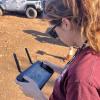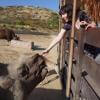Wildlife crime is one of the greatest challenges facing conservation, and one of the conservation tech world's biggest areas of innovation. With new ideas and solutions constantly being put forth to track and protect species targeted by poachers, manage protected areas and support rangers, and combat the growing online market for illegal wildlife products, the engineers and conservationists working to solve wildlife crime's many challenges rely on tools like machine learning, biologging, camera traps, acoustic monitoring, drones, mobile apps, and more.
This wide variety of overlapping technology makes our Wildlife Crime group a potential melting pot for many of our other communities, and makes it an especially exciting place to find collaborators working in different tech spheres to meet a common goal. Whether you're a camera trap expert looking for information on thermal vision to spot potential poachers, a machine learning expert with the skills to analyze acoustic data for gunshots, or a protected area manager seeking the latest integrated mobile tools, this group can connect you with the right members of our community!
Below, you'll find WILDLABS resources and conversations to help you understand how different technologies are being put to work in the fight against wildlife crime, and what conservation tech practitioners need for these tools to be effective.
Three Tutorials and Videos for Beginners:
- How do I use AI to fight wildlife crime? | Lily Xu, Tech Tutors
- WWF Wildlife Crime Technology Project | Eric Becker, Virtual Meetups
- SmartParks | Laurens de Groot, Virtual Meetups
Three Forum Threads for Beginners:
- Snare detection technologies | Rachel Kramer
- Tools for conservation management | Chris Muashekele
- Looking for Intelligence Database Software | Dexter Oelrichs
Three Articles for Beginners:
- Using AIS data to investigate the world's fishing ports, Max Schofield
- How do Wildlife Crime Experts view Remote Sensing Technologies used to Combat Illegal Wildlife Crime?, Isla Duporge
- Metal Detecting Sensors for Anti-Poaching, Sam Seccombe
Join this group now to get to know our community and start discussing solutions and ideas together!
Header photo: © Frank af Petersens/Save the Elephants
No showcases have been added to this group yet.
- @nadyam
- | she/her
Michigan State University
Conservation geneticist at Michigan State University. Co-founder of iCatch. Solving problems in monitoring, traceability, and enforcement through rapid species identification tech.
- 0 Resources
- 3 Discussions
- 6 Groups
- @nlubcker
- | Dr
Results-Driven R&D Project Manager | Data scientist | I'm a versatile professional with 10 years of global experience in conservation and research.
- 0 Resources
- 1 Discussions
- 7 Groups
- @mariahmeek
- | she/her
Michigan State University
Dr. Mariah Meek is the PI and co-founder of iCatch, an Associate Professor at Michigan State University, and the Director of Research at The Wilderness Society.
- 0 Resources
- 0 Discussions
- 5 Groups
Heading up comms for a conservation agency based in the United Arab Emirates
- 0 Resources
- 0 Discussions
- 6 Groups
- @CalumRyan
- | He/Him
Intern at Fauna & Flora working on the Spatial Monitoring and Reporting Tool (SMART)
- 0 Resources
- 0 Discussions
- 4 Groups
- 0 Resources
- 0 Discussions
- 16 Groups
Tech 4 Conservation
President, Tech 4 Conservation
- 0 Resources
- 7 Discussions
- 18 Groups
Partner in Conservation at WWF

- 0 Resources
- 17 Discussions
- 6 Groups
- @gzlazzari
- | she/her
I am a master's student working with the Genetics, Evolution, Ecology and Conservation of Carnivores Research Group at PUCRS/Brazil. I am especially interested in molecular techniques to answer genetic, ecological and forensic questions about jaguars.
- 0 Resources
- 0 Discussions
- 4 Groups
Wildlife conservationist
- 0 Resources
- 0 Discussions
- 11 Groups
I am a geneticist with a long term interest in using DNA markers to combat wildlife crime.
- 0 Resources
- 0 Discussions
- 4 Groups
PhD student with research focused on using on-site DNA sequencing for rapid species identification. Interested in wildlife forensics, and conservation genomics.
- 0 Resources
- 0 Discussions
- 4 Groups
The illegal wildlife trade varies widely regarding species and geographical variance, necessitating niche and tailored research. Against this background, this study on elephant poaching in Tanzania was conducted at the...
30 October 2023
With the rising threats to biodiversity such as wildlife crime, climate change and human-wildlife conflict today, wildlife monitoring technologies have become vital to study movement ecology, behaviour patterns, changes...
25 October 2023
Article
There is an illegal mining contract (it's literally against the constitution of Panama!) Being forced upon the people and nature of panama by the Canadian mining company First Quantum and a handful of corrupt...
23 October 2023
The WCS team in Uganda is working with impacted communities, district leaders and wildlife authorities to come up with innovative solutions to Human Wildlife Conflicts and curb wildlife crimes in our time. Check out...
5 September 2023
"Artificial Intelligence could be the solution needed to effectively monitor and safeguard vast landscapes across Africa that, up until now, have been protected solely by patrolling." Read Tusk's latest Medium blog on...
12 July 2023
Panthera’s Counter Wildlife Crime (CWC) program is one of five thematic, cross-regional programs that sit within its Conservation Science (CS) division. This role acts as a ‘force multiplier’ for the global experts,...
31 May 2023
WWF's recent Fuller Seminar Series on Artificial Intelligence and Conservation featured some familiar faces from the WILDLABS community, including our past Tech Tutor Lily Xu! Check out her presentation talking about AI...
26 April 2023
While tech deployment has often been hailed for playing a critical role in the fight against poaching, these technologies bring with them the risk of cyber attacks. This is based on a study conducted by Orange...
26 April 2023
Scholarships available for training courses focussing on nature restoration in East Africa
21 February 2023
Researchers and conservationists are embarking on a bold initiative to save the world's most trafficked wild mammal — the pangolin
16 February 2023
Technology to End the Sixth Mass Extinction. Salary: $104k-144K; Location: Washington DC or Seattle WA, potential hybrid; 5+ years of Full stack development experience; Deadline March 15th - view post for full job...
10 February 2023
This study uses passive acoustic monitoring to record the patterns of illegal cattle occurrence within protected areas in the Brazilian Pantanal.
12 January 2023
September 2025
January 2023
42 Products
1 R&D Projects
42 Organisations
Recently updated products
Recently updated R&D Projects
Recently updated organisations
| Description | Activity | Replies | Groups | Updated |
|---|---|---|---|---|
| Hi Gautam, I think the best way is have them read the thread, and then get back to me with questions - I can then respond on a case-by-case basis. Our website is here:... |
|
Wildlife Crime | 9 years 6 months ago | |
| Hi All, Rachel has asked that I tell you a bit about who we are and what we do and how we think we can help this group. We are... |
|
Wildlife Crime | 9 years 6 months ago | |
| This post made me wander whether we could employ social media listening tools to identify illegal wildlife trade hotspots, levels, changes in ... |
|
Wildlife Crime | 9 years 6 months ago | |
| The Journal of Animal Ecology with the Journal of Applied Ecology and Methods in Ecology and Evolution have published a... |
|
Wildlife Crime | 9 years 6 months ago | |
| Watch streaming footage here of John Amos, President of Sky Truth, speaking on Cheap Space, DIY Imaging and Big... |
|
Wildlife Crime | 9 years 9 months ago |
























